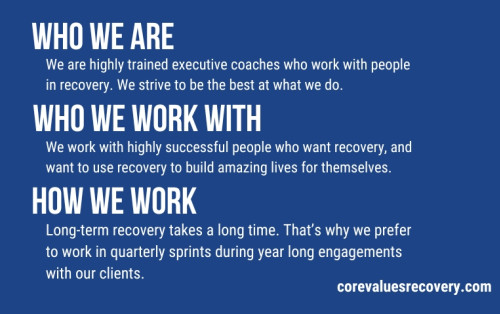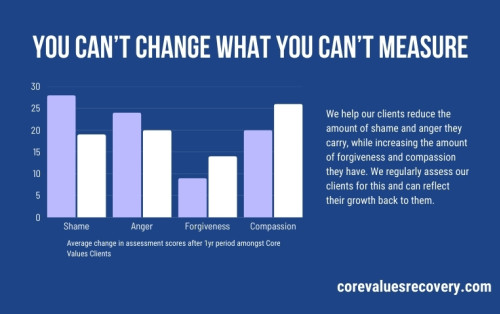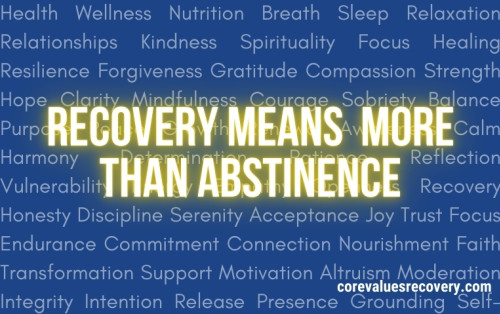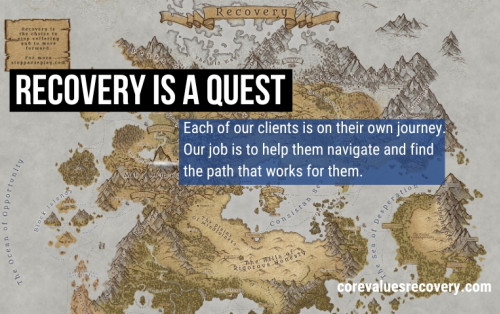






Core Values Recovery
Treatment Focus
This center treats substance use disorders and co-occurring mental health conditions. Your treatment plan addresses each condition at once with personalized, compassionate care for comprehensive healing.
Primary Level of Care
Recovery coaching is a type of support service designed to help individuals maintain their recovery goals, provide guidance and support, and connect them with resources and community-based services.
Claimed
Recovery.com has connected directly with this treatment provider to validate the information in their profile.
Treatment Focus
This center treats substance use disorders and co-occurring mental health conditions. Your treatment plan addresses each condition at once with personalized, compassionate care for comprehensive healing.
Primary Level of Care
Recovery coaching is a type of support service designed to help individuals maintain their recovery goals, provide guidance and support, and connect them with resources and community-based services.
Private Pay
You pay directly for treatment out of pocket. This approach can offer enhanced privacy and flexibility, without involving insurance. Exact costs vary based on program and length of stay. Contact the center for specific details.
Core Values Recovery
Core Values Recovery
About Core Values Recovery
Core Values Recovery helps people get and stay in long-term recovery. They use world-class coaching and secure technology to support you and your family to move on and heal from addiction and mental health challenges. They are different. Their coaches aren’t just recovery coaches; they're trained, ICF-certified executive coaches whose job it is to help you recover and advance. What sets Core Values Recovery apart is they look at the whole person — help prevent relapse, but also reduce the guilt, shame, anger, and grief you and your family carry.
You can’t change what you don't measure, so Core Values Recovery uses their proprietary digital platform and integrates with your wearable technology to assist your wellness journey. Their evidence-based approach combines traditional recovery methods with cutting-edge technology, allowing progress to be tracked in real-time. Meaningful data is gathered on sleep patterns and stress levels to help prevent relapse and improve your quality of life. They work with the whole family. Each client gets a private individual coach and a family coach included in our services because family involvement is key to long-term recovery. Core Values Recovery works well with executives, high achievers, and those who want to use their recovery to improve every aspect of their life.

Highlights from the Center
Highlights
These highlights are provided by and paid for by the center.
Addiction Recovery
Center Overview
Treatment Focus
This center treats substance use disorders and co-occurring mental health conditions. Your treatment plan addresses each condition at once with personalized, compassionate care for comprehensive healing.
Pricing and Program Length
Estimated Center Costs
Center pricing can vary based on program and length of stay. Contact the center for more information. Recovery.com strives for price transparency so you can make an informed decision.
Meet Your Care Team

Clay Johnson
CEO & Head Coach
Clay Johnson is the co-founder of Core Values Recovery. He is an executive coach, certified by the International Coach Federation, and a certified Interventionist. He is also a former Presidential Innovation Fellow, and won the President's Volunteer Service award. Clay’s work has appeared in the New York Times, Fox News, the Washington Post, NPR, The Wall Street Journal, the Economist, NBC News, ABC News, CBS News, MSNBC, and CNN.

David Edwards
Co-Founder, Coach & Head of Business Development
David is an executive coach and co-founder of Core Values Recovery, with a personal recovery journey that began in 2013. Drawing on his years of sobriety and extensive business experience, David is dedicated to helping others achieve lasting recovery. He holds credentials as an Associate Certified Coach (ACC), Certified Professional Coach (CPC), Certified Recovery Specialist (CRS), and Interventionist. His passion lies in guiding individuals toward sustainable, long-term recovery and personal growth.
Levels of Care







Your Care Options
Specializations
Executives
Executive treatment programs typically directly support the needs of people who manage businesses and may provide flexible schedules and office space to allow work during treatment.
Recovery Coaching
A support service designed to help individuals identify and maintain their personal recovery goals, provide guidance and support, and connect them with recovery resources and community-based services.
Professionals
Busy, high-ranking professionals get the personalized treatment they need with greater accommodations for work, privacy, and outside communication.
Who We Treat
Executives
Executive treatment programs typically directly support the needs of people who manage businesses and may provide flexible schedules and office space to allow work during treatment.
LGBTQ+
Addiction and mental illnesses in the LGBTQ+ community must be treated with an affirming, safe, and relevant approach, which many centers provide.
Professionals
Busy, high-ranking professionals get the personalized treatment they need with greater accommodations for work, privacy, and outside communication.
Approaches
Twelve Step
Incorporating spirituality, community, and responsibility, 12-Step philosophies prioritize the guidance of a Higher Power and a continuation of 12-Step practices.
Non 12 Step
Non-12-Step philosophies veer from the spiritual focus of the 12-Steps and instead treat the disease of addiction with holistic or secular modalities.
Holistic
A non-medicinal, wellness-focused approach that aims to align the mind, body, and spirit for deep and lasting healing.
Strengths-Based
Providers using a strengths-based philosophy focus on the positive traits of their patients, creating a positive feedback loop that grows confidence.
Wellness
Wellness philosophies focus on the physical, mental, and spiritual wellness of each patient, helping them restore purpose with natural remedies.
Therapies
Life Skills
Teaching life skills like cooking, cleaning, clear communication, and even basic math provides a strong foundation for continued recovery.
Motivational Interviewing
Based on the idea that motivation to change comes from within, providers use a conversational framework to discover personalized methods for change.
Conditions We Treat
Anxiety
Anxiety is a common mental health condition that can include excessive worry, panic attacks, physical tension, and increased blood pressure.
Depression
Symptoms of depression may include fatigue, a sense of numbness, and loss of interest in activities. This condition can range from mild to severe.
Substances We Treat
Cocaine
Cocaine is a stimulant with euphoric effects. Agitation, muscle ticks, psychosis, and heart issues are common symptoms of cocaine abuse.
Prescription Drugs
It's possible to abuse any drug, even prescribed ones. If you crave a medication, or regularly take it more than directed, you may have an addiction.
Benzodiazepines
Benzodiazepines are prescribed to treat anxiety and sleep issues. They are highly habit forming, and their abuse can cause mood changes and poor judgement.
Ecstasy
Ecstasy is a stimulant that causes intense euphoria and heightened awareness. Abuse of this drug can trigger depression, insomnia, and memory problems.
Co-Occurring Disorders
A person with multiple mental health diagnoses, such as addiction and depression, has co-occurring disorders also called dual diagnosis.
Drug Addiction
Drug addiction is the excessive and repetitive use of substances, despite harmful consequences to a person's life, health, and relationships.
Heroin
Heroin is a highly addictive and illegal opioid. It can cause insomnia, collapsed veins, heart issues, and additional mental health issues.
Synthetic Drugs
Synthetic drugs are made in a lab, unlike plant-based drugs like mushrooms. Most synthetic drugs are either stimulants or synthetic cannabinoids.






